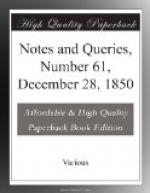Can any of your readers give me a clue to the derivation of this word? I certainly never heard it before.
I ought perhaps to state, that this is a country parish in Herefordshire.
W.M.
Pembridge, Dec. 16.
"Away, let nought to love displeasing".—Is it known who was the author of the song to be found in Percy’s Reliques, and many other collections, beginning—
“Away, let nought to love displeasing.”
The first collection, so far as I know, in which it appears is entitled Miscellaneous Poems by several Hands, published by D. Lewis, London, 1726; and in this work it is called a translation from the ancient British. Does this mean a translation of an ancient poem, or a translation of a poem written in some extant dialect of the language anciently spoken in Britain? Either would appear to me incredible.
As I feel much interested in the poetry of English songs, can you or any of your correspondents inform me if there exists any good collection; that is, a collection, of such only as are excellent of their respective kinds? That the English language possesses materials for forming such a collection, and an extensive one too, I have no doubt, though I have never met with one. And, if there be none that answers the description I give, I should be glad of information respecting the best that exist.
It is scarcely necessary to add, that my standard of excellence would admit only those which bore the character of “immortal verse,” rejecting such as had been saved merely by the music to which they had been “married.”
SAMUEL HICKSON.
Dec. 14. 1850.
Baron Muenchausen.—Who was the author of this renowned hero’s adventures? The Conversations-Lexicon (art. Muenchausen) states that the stories are to be found under the title of “Mendacia Ridicula,” in vol. iii. of Deliciae Academicae, by J.P. Lange (Heilbronn, 1665); and that “at a later period they appeared in England, where a reviewer supposed them to be a satire on the ministry.” I remember to have read when a boy (I think in The Percy Anecdotes), that the book was written by an Englishman who was styled “M——,” and was described as having been long a prisoner in the Bastille.
Since writing thus far I have seen the note by J.S. (Vol. ii., pp. 262-3.) on Muenchausen’s story of the horn. The idea of sounds frozen in the air, and thawed by returning warmth, was no invention of “Castilian, in his Aulicus” (i.e. Castiglione, author of Il Cortegiano); for, besides that, it is found in his contemporary Rabelais (liv. iv. cc. 55-6), I believe it may be traced to one of the later Greek writers, from whom Bishop Taylor, in one of his sermons, borrows it as an illustration.
J.C.R.
"Sing Tantararara Rogues all,” &c.—The above is the chorus of many satirical songs written to expose the malpractices of peculators, &c. Can any of your readers point out who was the author of the original song, and where it is to be found?




